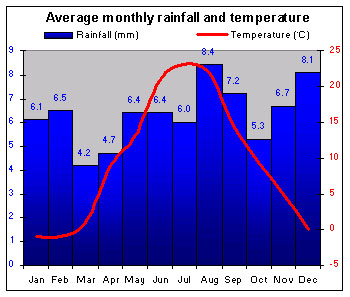COUNTRY INFORMATION |
Introduction |
Luxembourg shares borders with the industrial regions of Germany, France, and Belgium, and has the highest per capita income in the EU. Making up part of the plateau of the Ardennes, its countryside is undulating and forested. Its prosperity was once based on steel; before World War II it produced more per capita than the USA. Today, it is known as a tax haven and banking center, and as the headquarters of key EU institutions. |
|
Climate |
 |
The south, where vines grow, is the warmest area. Winter is cold and snowy, especially in the Ardennes. |
|
People |
| Languages |
Letzeburgish, German, French |
|
| URBAN/RURAL POPULATION DIVIDE |
|
|
|
Nearly a third of its residents and half of Luxembourg's workers are foreigners. Integration has been straightforward; most are fellow western Europeans and Roman Catholics, mainly from Italy and Portugal. Life in Luxembourg is comfortable. Salaries are high, unemployment very low, and social tensions few. |
|
Economy |
| GNP (US$) |
18439
|
M |
GNP World rank |
69
|
|
| Inflation |
3 |
% |
Unemployment |
3 |
% |
|
StrengthsSite of EU institutions. Banking secrecy and expertise make the capital home to around 1000 investment funds and over 200 banks – more than in any other city in the world. WeaknessesInternational service industries account for 65% of GDP, making Luxembourg vulnerable to changing conditions overseas. Downturn in steel market. |
|
Politics |
| Lower house |
Last election |
1999 |
Next election |
2004 |
| Upper house |
Last election |
Not applicable |
Next election |
Not applicable |
|
There is remarkable political consensus, and governments are characterized by coalitions and long-serving prime ministers; the grand duke's role is mostly ceremonial. The main issues relate to European integration. |
|
Resources |
|
|
| Oil reserves (barrels) |
No data |
Oil production (barrels/day) |
Not an oil producer |
|
Most energy is imported; Luxembourg produces only a small amount of hydroelectricity. Arbed is part of the world's largest steel producing company. |
|
Health |
| Life expectancy |
77 |
Life expect. World rank |
28 |
| Population per doctor |
368 |
Infant mortality (per 1000 births) |
5 |
|
|
|
| Principal causes of death |
Cerebrovascular and heart diseases, cancers, accidents |
|
There are no private commercial hospitals in Luxembourg; they are run either by the state or by nuns. Patients' fees are refunded from the state sickness fund. |
|
Education |
| Literacy |
99 |
% |
Expend. % GNP |
4 |
%
|
|
| PERCENTAGE OF POPULATION IN FULL TIME EDUCATION |
|
| Primary |
99 |
% |
Secondary |
88 |
% |
Tertiary |
10 |
% |
|
Teaching is mainly in German at primary and French at secondary level. Higher education is limited and many students go to universities in other European countries. Training given by Luxembourg banks is reputed to be the best in Europe. |
|
Wealth |
| Cars |
588 |
per 1,000 population |
| Telephones |
750 |
per 1,000 population |
| Televisions |
391 |
per 1,000 population |
|
With the highest per capita income in the world, Luxembourgers enjoy a comfortable lifestyle. Recent strong economic performance has allowed them to benefit both from lower taxes and increased spending on social security. Low unemployment has led to the recruitment of foreign workers, mainly from neighboring countries or from other EU countries such as Portugal and Italy, to take less well-paid jobs. As elsewhere in western Europe, financing care of the aging population is likely to be a burden in the future.
|
History |
Until 1867, Luxembourg was ruled by a succession of neighboring European powers. - 1890 Link with Dutch throne ends.
- 1921 Economic union with Belgium. End of German ties.
- 1940–1944 German occupation.
- 1948 Benelux treaty (1944) creating a customs union comes into effect.
- 1957 Signs Treaty of Rome as one of six founding members of EEC.
- 1995 Premier Jacques Santer is president of European Commission.
- 1999 Santer resigns amid corruption allegations. Socialist losses in general election.
- 2000 Grand Duke Jean abdicates in favor of his son, Henri.
- 2002 Euro fully adopted.
|
|